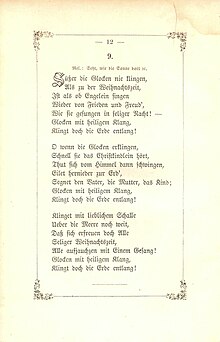Sweeter the bells never sound
The bells never sound sweeter is a well-known German Christmas carol from the 19th century.
history
The text was written by the German theologian and educator Friedrich Wilhelm Kritzinger (1816–1890), director of the teacher training institute in Droyssig . The song was first published in the Liederstrauß collection by Bernhard Brähmig, who also worked as a music teacher at the Droyßiger Anstalten. Kritzinger published the text again in 1866 in his Christmas booklet for school and home .
The , to which Kritzinger explicitly underlined his poem, comes from the folk song See how the sun sets there , which has been handed down since 1841 in Thuringia and since 1847 in Silesia . Occasionally a date of origin is assumed to be before 1826. Karl Kummerel (1822–1857) created a rewording of the song in 1847, which is why he is often incorrectly stated as the author. The folksong is based on the folk art song There the sun sets in the west on a text by the Zittau teacher Ernst Heinrich Schwabe (1787–1818), to which the composer August Harder published a (albeit different) melody in 1808. The melody of the folk song was also widespread in numerous other variants (including Das Liebchen im Grabe ). Significantly, even in the older texts about the melody of bells there is talk of what Kritzinger may have served as a suggestion.
Since the 1890s at the latest, and from then on very often, the song can be found in books of everyday songs.
Another setting of the text by a certain Wilhelm Ritzmann is documented in 1893 in the song book Frohe Lieder of the German Baptist community in Cleveland (Ohio).
The song creates a hopeful and healing mood. The sound of the bell stands as a symbol of peace, joy and the joy of Christmas.
song lyrics
The text has come down to us in several, slightly different versions. Kritzinger's original text is printed below:
The bells never
ring sweeter than
at Christmas time,
It is as if angels are singing
Again of peace and joy,
As they sang on a blessed night! -
Bells with a sacred sound,
ring the earth!
O when the bells
ring
, the little
Christ child hears quickly:
Then swing yourself from heaven,
hurry down to earth.
Bless the father, the mother, the child;
Bells with a sacred sound,
ring the earth!
Sounds far across
the seas with a lovely sound ,
That
everyone rejoices in the
blessed Christmas season,
Everyone shouts with a song!
Bells with a sacred sound,
ring the earth!
literature
- Ingeborg Weber-Kellermann : The book of Christmas carols. 10 edition. Atlantis, Zurich 2003, ISBN 3-254-08213-3 , pp. 260-262.
- Franz Xaver Erni, Heinz Alexander Erni: Silent Night, Holy Night. The most beautiful Christmas carols. Herder, Freiburg im Breisgau 2002, ISBN 3-451-27367-5 , p. 120 u. 190.
- Gottfried Natalis, Ernst Klusen : The Christmas Book of Songs. Insel, Frankfurt am Main 1975, ISBN 3-458-31857-7 .
Web links
- Sheet music in the public domain by Sweets the Bells Never Ring in the Choral Public Domain Library - ChoralWiki (English)
- The bells never sound sweeter in the song project of Carus-Verlag and SWR2
- The bells never sound sweeter, lieder-archiv.de
Individual evidence
- ^ Bernhard Brähmig: bouquet of songs. Selection of cheerful and serious chants for daughter schools. Issue 3. Merseburger, Leipzig 1860 [?]. 18th edition 1897, p. 84 f. ( Text archive - Internet Archive ).
- ↑ a b Wilhelm Kritzinger: Christmas books for school and home. Webel, Zeitz 1866, OCLC 246776240 , p. 12.
- ↑ a b c Franz Magnus Böhme : Popular songs of the Germans in the 18th and 19th centuries. Breitkopf and Härtel, Leipzig 1895, p. 180 ( Textarchiv - Internet Archive ).
- ↑ Hildegard Meyberg (ed.): Let's sing in the Christmas season. Auer, Donauwörth 1985, ISBN 3-403-01602-1 , p. 248.
- ↑ See how the sun is sinking there at volksliederarchiv.de, accessed on December 27, 2015
- ↑ August Heinrich Hoffmann von Fallersleben, Karl Hermann Prahl: Our folk songs. 4th edition. W. Engelmann, Leipzig 1900, p. 217 ( Textarchiv - Internet Archive ).
- ↑ There the sun sinks in the west at volksliederarchiv.de, accessed on December 1, 2019
- ^ Karl Goedeke , Edmund Goetze: Grundrisz for the history of German poetry from the sources. Seventh book: Time of World War (1790-1815): Fantastic poetry. Division II. 2nd edition. Ehlermann, Dresden 1900, p. 307 ( Textarchiv - Internet Archive ).
- ↑ August Heinrich Hoffmann von Fallersleben, Karl Hermann Prahl: Our folk songs. 4th edition. W. Engelmann, Leipzig 1900, p. 60 ( Textarchiv - Internet Archive ).
- ↑ Ludwig Erk , Franz Magnus Böhme (Ed.): Deutscher Liederhort . Volume 2. Breitkopf and Härtel, Leipzig 1893, p. 539 f. ( Digitized version ).
- ↑ Bernd Pachnicke (Ed.): German folk songs. Singing voice and piano. Edition Peters, Leipzig 1976, DNB 1006936580 , p. 337.
-
↑ Julius Hofmann (Ed.): German song book: Collection of chorales and songs for school and home. Zion Ward Sunday School, Baltimore, Md. 1895, p. 126 ( online at hymnary.org);
Ludwig Tiesmeyer, Paul Zauleck (eds.), Helias Putsch (musical arrangement): The book of Christmas carols. 2nd, completely revised edition. Heinsius, Bremen 1896, p. 106 f. ( Wikisource ). - ↑ deutscheslied.com
- ↑ The bells never ring sweeter. hymnary.org, accessed July 8, 2020.

